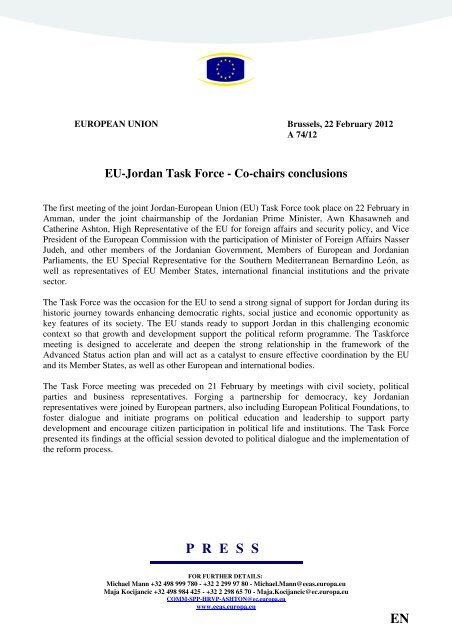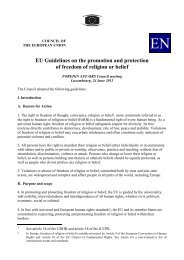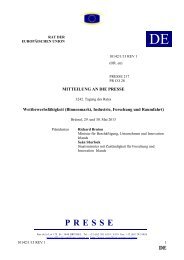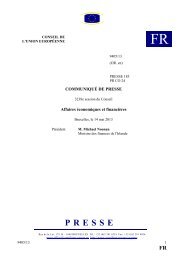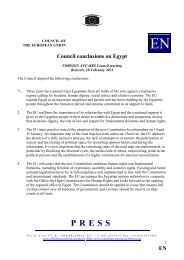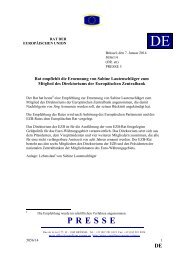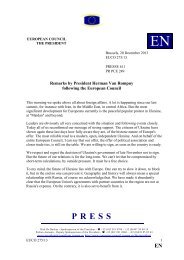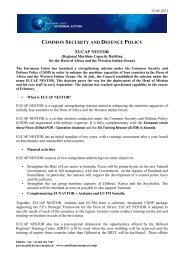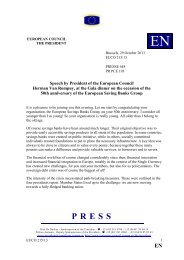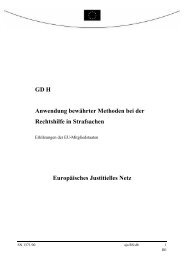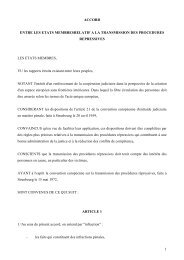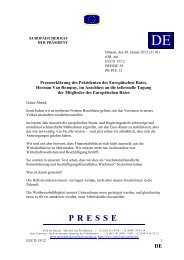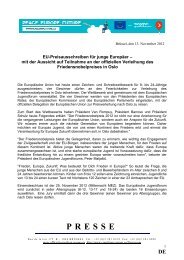EU-Jordan Task Force - Co-chairs conclusions - Europa
EU-Jordan Task Force - Co-chairs conclusions - Europa
EU-Jordan Task Force - Co-chairs conclusions - Europa
Create successful ePaper yourself
Turn your PDF publications into a flip-book with our unique Google optimized e-Paper software.
<strong>EU</strong>ROPEAN UNION Brussels, 22 February 2012<br />
A 74/12<br />
<strong>EU</strong>-<strong>Jordan</strong> <strong>Task</strong> <strong>Force</strong> - <strong>Co</strong>-<strong>chairs</strong> <strong>conclusions</strong><br />
The first meeting of the joint <strong>Jordan</strong>-European Union (<strong>EU</strong>) <strong>Task</strong> <strong>Force</strong> took place on 22 February in<br />
Amman, under the joint chairmanship of the <strong>Jordan</strong>ian Prime Minister, Awn Khasawneh and<br />
Catherine Ashton, High Representative of the <strong>EU</strong> for foreign affairs and security policy, and Vice<br />
President of the European <strong>Co</strong>mmission with the participation of Minister of Foreign Affairs Nasser<br />
Judeh, and other members of the <strong>Jordan</strong>ian Government, Members of European and <strong>Jordan</strong>ian<br />
Parliaments, the <strong>EU</strong> Special Representative for the Southern Mediterranean Bernardino León, as<br />
well as representatives of <strong>EU</strong> Member States, international financial institutions and the private<br />
sector.<br />
The <strong>Task</strong> <strong>Force</strong> was the occasion for the <strong>EU</strong> to send a strong signal of support for <strong>Jordan</strong> during its<br />
historic journey towards enhancing democratic rights, social justice and economic opportunity as<br />
key features of its society. The <strong>EU</strong> stands ready to support <strong>Jordan</strong> in this challenging economic<br />
context so that growth and development support the political reform programme. The <strong>Task</strong>force<br />
meeting is designed to accelerate and deepen the strong relationship in the framework of the<br />
Advanced Status action plan and will act as a catalyst to ensure effective coordination by the <strong>EU</strong><br />
and its Member States, as well as other European and international bodies.<br />
The <strong>Task</strong> <strong>Force</strong> meeting was preceded on 21 February by meetings with civil society, political<br />
parties and business representatives. Forging a partnership for democracy, key <strong>Jordan</strong>ian<br />
representatives were joined by European partners, also including European Political Foundations, to<br />
foster dialogue and initiate programs on political education and leadership to support party<br />
development and encourage citizen participation in political life and institutions. The <strong>Task</strong> <strong>Force</strong><br />
presented its findings at the official session devoted to political dialogue and the implementation of<br />
the reform process.<br />
P R E S S<br />
FOR FURTHER DETAILS:<br />
Michael Mann +32 498 999 780 - +32 2 299 97 80 - Michael.Mann@eeas.europa.eu<br />
Maja Kocijancic +32 498 984 425 - +32 2 298 65 70 - Maja.Kocijancic@ec.europa.eu<br />
COMM-SPP-HRVP-ASHTON@ec.europa.eu<br />
www.eeas.europa.eu<br />
EN
An ever closer partnership<br />
Over the years, <strong>Jordan</strong> and the European Union have consolidated a strong partnership, in particular<br />
in the framework of the Neighbourhood Policy and of the Union for the Mediterranean. <strong>Jordan</strong> and<br />
the <strong>EU</strong> share the objective of the promotion of peace, stability and prosperity and the overarching<br />
values for the respect of the rule of law, human rights and good governance.<br />
The European Union and <strong>Jordan</strong> have made significant strides in building an outward-looking<br />
partnership, rooted in thriving political links, a shared attachment to deep democracy and the<br />
consolidation and expansion of trade and people-to-people links. It is a partnership in which civil<br />
society plays a key role in ensuring an equitable and inclusive society. This year, <strong>Jordan</strong> and the <strong>EU</strong><br />
celebrate the tenth anniversary of the entering into force of the Association Agreement, and in<br />
October 2010, our relationship shifted into a higher gear with the Advanced Status” partnership and<br />
the new <strong>EU</strong>-<strong>Jordan</strong> ENP Action Plan.<br />
In a context of democratic transformations and reforms, the <strong>EU</strong> has opened a new chapter in its<br />
engagement with the region. The work of the <strong>Task</strong> <strong>Force</strong> represents an additional step in the<br />
development of a new relationship, based on a mutual commitment to closer integration.<br />
Providing greater support to partners engaged in building deep and sustainable democracy is the<br />
cornerstone of the new approach outlined by the <strong>EU</strong> in the new ENP Strategy adopted in May 2011.<br />
The new ENP is based on differentiation, mutual accountability and more for more.<br />
<strong>Jordan</strong>’s political reform path:<br />
The <strong>Jordan</strong>ian government briefed the <strong>Task</strong> <strong>Force</strong> on the ongoing process of political reforms and<br />
the detailed timeline of their implementation, emphasising their potential to transform the<br />
institutional set-up of the country. For <strong>Jordan</strong> 2012 will be the year of delivery. <strong>Jordan</strong> is committed<br />
to pursuing a sustained pace of reforms which are vital for the consolidation of the institutions<br />
deepening democracy and the rule of law. The <strong>Task</strong> <strong>Force</strong> underlined the need to ensure increased<br />
public participation and grass-roots involvement in the decision-making process and to respond<br />
positively to the legitimate expectations that <strong>Jordan</strong>ian citizens have in holding fair and transparent<br />
elections.<br />
The <strong>EU</strong> strongly commends the leadership of His Majesty King Abdullah II bin Al Hussein and the<br />
efforts of the <strong>Jordan</strong>ian Government and Parliament. It endorses the efforts already made in the<br />
course of 2011 and encourages to build further on these foundations for a stronger democracy. The<br />
<strong>Task</strong> <strong>Force</strong> agreed that adoption of remaining legislation is of paramount importance. The <strong>EU</strong><br />
emphasised that it stood ready, together with Member States and other partners notably the <strong>Co</strong>uncil<br />
of Europe, to provide further technical expertise, if requested. The principles of democracy and<br />
good governance will underpin joint reform programmes on the constitutional court and justice<br />
sector, public administration and the wider economy.<br />
Both sides discussed <strong>Jordan</strong>’s commitment to conducting free, fair and fully transparent elections,<br />
and to take all necessary measures towards this objective.<br />
2<br />
EN
The <strong>Task</strong> <strong>Force</strong> underlined that fighting corruption is essential to cement the rule of law and<br />
democracy, and boost economic growth. In this context, the <strong>EU</strong> and <strong>Jordan</strong> have launched a<br />
twinning arrangement with the Anti-<strong>Co</strong>rruption <strong>Co</strong>mmission (ACC) to enhance transparency and<br />
strengthen law enforcement mechanisms. This will build on the extensive co-operation already<br />
underway in the all-important field of public financial management.<br />
The <strong>Task</strong> <strong>Force</strong> reiterated their wish to further develop exchanges between the <strong>Jordan</strong>ian and the<br />
European Parliaments, notably among political groups, and through the <strong>EU</strong>-<strong>Jordan</strong> Parliamentary<br />
<strong>Co</strong>mmittee.<br />
The <strong>Task</strong>force welcomed the debriefing by civil society and political party representatives on the<br />
key findings of their discussions. They emphasised the progress achieved after His Majesty King<br />
Abdullah II assumed his power in 1999, where <strong>Jordan</strong> had witnessed its first steps towards a path to<br />
greater democracy and more opportunities for citizens to meaningfully engage in political life.<br />
Notably the role of the civil society had been instrumental in helping the country to organise and<br />
hold parliamentary and municipal elections in regular intervals. The participation of women as<br />
voters, activists, candidates and elected officials had also grown. The capacity of <strong>Jordan</strong>ian civil<br />
society organisations to advocate for more transparent and representative government institutions<br />
and policies had increased. The civil society’s role was crucial in promoting women candidates and<br />
active youth participation.<br />
Building on these achievements the role of the civil society should be further encouraged as it is<br />
crucial for political culture and progress of reforms. <strong>Jordan</strong> is still faced with some challenges<br />
which have to be addressed. To this end, the strengthening of the civil society is a crucial element in<br />
order to help the <strong>Jordan</strong>ian people address these shortcomings, support grassroots organisations to<br />
enhance <strong>Jordan</strong>ian citizens political participation in order to ensure the success of the<br />
democratisation process.<br />
Reinforced co-operation from the European Union:<br />
Both sides agreed that the main economic priority at this stage is job creation by enhancing<br />
inclusive growth. All programmes and contributions from <strong>EU</strong> institutions, member states, the<br />
private sector and international partners should contribute to this end. Employment means<br />
sustainable growth but also inclusiveness, social cohesion and moreover dignity for citizens.<br />
The <strong>EU</strong> and <strong>Jordan</strong> will launch a dialogue on economic reforms to enhance competitiveness,<br />
including such key areas as attracting inward investment, boosting innovation and encouraging<br />
business start-ups and expanding SMEs. Greater transparency and accountability in taxation and<br />
the management of public finances will also be a priority.<br />
The <strong>EU</strong> welcomed <strong>Jordan</strong>’s commitment to implementing the measures agreed in the ENP Action<br />
Plan, based upon <strong>Jordan</strong>’s objectives of political and economic reform and further integration into<br />
European economic and social structures.<br />
3<br />
EN
Facilitation of trade and investment and creation of jobs:<br />
The development of trade and economic relations is a key aspect of the deepening of the bilateral<br />
relations. In December 2011, the <strong>Co</strong>uncil of the European Union gave the <strong>Co</strong>mmission the mandate<br />
to open bilateral negotiations with <strong>Jordan</strong> with a view to establishing a "deep and comprehensive<br />
free trade area”. The <strong>Task</strong> <strong>Force</strong> welcomed the launch of the preparatory process in the coming<br />
weeks, which would also identify specific needs to be addressed on both sides and encourage<br />
substantive negotiations to start as soon as possible after its completion, The meeting with the<br />
business community reported that in order to facilitate access for <strong>Jordan</strong>ian goods and services to<br />
the <strong>EU</strong> market, a review of the rules of origin to meet the capabilities of the <strong>Jordan</strong>ian industrial<br />
sector is required.<br />
The <strong>Task</strong> <strong>Force</strong> welcomed the <strong>EU</strong>’s commitment to working with <strong>Jordan</strong> to further reduce technical<br />
barriers to trade. It noted that the offer to negotiate and conclude an Agreement on <strong>Co</strong>nformity<br />
Assessment and Acceptance of Industrial Products (ACAA) was all the more relevant as the two<br />
parties sought to further deepen their bilateral trade relations. To reinforce the <strong>Jordan</strong>ian legislative<br />
framework and the quality infrastructure, <strong>Jordan</strong> has started the approximation of horizontal<br />
legislation in the fields of standards, metrology, conformity assessment and accreditation, in<br />
addition to market surveillance. Moreover, the approximation of vertical legislation in the priority<br />
sectors of electrical equipment, gas appliances and toys has already started and in good progress<br />
The <strong>Task</strong> <strong>Force</strong> also welcomed the active participation of CEOs from Europe and encouraged<br />
them to explore potential investment opportunities that would strengthen the links between the <strong>EU</strong><br />
and <strong>Jordan</strong>. Transport is of particular importance given the need for greater mobility that will<br />
improve access to job opportunities, promoting economic growth and increased cohesion between<br />
the regions. The energy and water sectors are also of strategic importance to the development of<br />
<strong>Jordan</strong>. The <strong>Task</strong> <strong>Force</strong> welcomed the contribution from leading executives in these sectors with a<br />
view to promoting further investment that can improve <strong>Jordan</strong>'s access to secure, affordable and<br />
sustainable sources of water and energy as well as other natural resources essential to enhancing<br />
economic growth.<br />
Small and medium-sized enterprises (SMEs) will remain the lifeblood of the <strong>Jordan</strong>ian economy<br />
and essential to ensuring that the benefits of prosperity are widely shared around the country. The<br />
<strong>Task</strong> <strong>Force</strong> confirmed it will take a range of measures to improve their business environment and<br />
create the conditions for growth. The <strong>Jordan</strong>ian Government and the <strong>EU</strong> signed financing<br />
agreements on the occasion of the <strong>Task</strong> <strong>Force</strong> for two new projects with a total <strong>EU</strong> contribution of<br />
€20 million, as previously committed to promote the growth of SMEs this year. One focuses on<br />
SMEs, micro-enterprises, and women entrepreneurs particularly outside Amman, while the other<br />
supports research and innovation benefiting in particular small companies. These projects reflect<br />
key priorities of <strong>EU</strong> co-operation with <strong>Jordan</strong>, which has as an objective the unleashing of potential<br />
at the local level and the establishment of a framework that provides incentives for local<br />
development.<br />
4<br />
EN
Financial and Technical Assistance:<br />
The <strong>Task</strong> <strong>Force</strong> noted that support for SMEs is just one of the priorities that the <strong>EU</strong> focuses on<br />
through its co-operation. The European Union and its Member States provide wide-ranging<br />
technical and financial assistance to <strong>Jordan</strong>, aligning support, in the spirit of partnership, to<br />
<strong>Jordan</strong>'s own growth and reform plans. Support from the <strong>EU</strong> itself, provided principally through<br />
the European Neighbourhood Partnership Instrument (ENPI), targets in particular four fields:<br />
political reform, human rights, media, and justice; trade, enterprise and investment development;<br />
sustainability and inclusivity of growth; and institution-building and public administration reform.<br />
The <strong>EU</strong> has made €223 million available for bilateral co-operation with <strong>Jordan</strong> for the period 2011<br />
to 2013, as per the National Indicative Programme (NIP) 2011-2013.<br />
In order to support implementation of key reforms in a difficult macro-economic context, the <strong>EU</strong><br />
will make available in 2012 an additional amount of €70 million, in line with the principles of<br />
the <strong>Co</strong>mmunication of March 2011, making available €30 million immediately, through the<br />
new programme SPRING (Support for Partnership, Reform and Inclusive Growth). Support will<br />
focus on a limited number of priorities with particular emphasis on good governance and economic<br />
growth (notably SME support and vocational training).<br />
The SPRING allocation brings the total of bi-lateral <strong>EU</strong> grant funds available to <strong>Jordan</strong> for 2011 to<br />
2013 to nearly €300 million.<br />
In 2011, in agreement with the <strong>Jordan</strong>ian Government and as per NIP 2011-2013, the <strong>EU</strong><br />
committed €111 million instead of the €71 million foreseen, by bringing forward commitments<br />
foreseen for 2013 in order to address priority needs. The frontloaded allocations of €40 million, of<br />
which €20 million will be used for two programmes targeting SMEs, and €20 million to an ongoing<br />
programme supporting Public Financial Management, thus increasing the programme budget to €65<br />
million.<br />
Other funds committed for which financing agreements were signed in 2011 included targeted<br />
renewable energy (€35 million), education reform (€23 million), democratic governance (€10<br />
million), improved water resources for low income communities (€10 million), and supporting local<br />
economic development (€5 million), in addition to ongoing support for the implementation of the<br />
ENP Action plan through the provision of technical assistance and support for twinning initiatives<br />
designed to build public administration capacity.<br />
A substantial part of assistance is provided through sector budget support, which is accompanied<br />
by high level policy dialogue and assistance to improve public financial management.<br />
<strong>Jordan</strong> participates in a range of regional programmes supported by the <strong>EU</strong>, including Euromed<br />
Police, Euromed Justice, Euromed Youth, Euromed Audiovisuel, Euromed Migration, and Euromed<br />
Heritage.<br />
Civil society capacity building is a priority for both the <strong>EU</strong> and <strong>Jordan</strong>, and €650,000 is available<br />
in 2012 for projects in <strong>Jordan</strong> in the framework of the new Neighbourhood Civil Society Facility.<br />
More that 30 projects with civil society are ongoing, supported through the European Instrument<br />
for Democracy and Human Rights (EIDHR) and the Non-state Actors programme.<br />
The <strong>Task</strong> <strong>Force</strong> noted that more than ten <strong>EU</strong> Member States have bi-lateral co-operation<br />
programmes with <strong>Jordan</strong>, or regional programmes that involve <strong>Jordan</strong>. The <strong>EU</strong> and its Member<br />
States are committed to co-ordinating closely their initiatives in the interests of aid effectiveness<br />
and to maximise the benefits of co-operation.<br />
5<br />
EN
Member State support to <strong>Jordan</strong> is provided through soft loans and grants, covering a wide range<br />
of sectors. These include the environment, renewable energy and energy efficiency, as well as water<br />
and transportation; good governance, and constitutional and political reform; SME development,<br />
trade-related assistance, and tourism. <strong>EU</strong> Member State support is also provided in the sectors of<br />
education and vocational training, local development, and the promotion of gender equality. <strong>Co</strong>operation<br />
funding ceilings mainly in the form of soft loans is also available from the <strong>EU</strong> Member<br />
States at an estimated indicative amount up to €1.2 billion for the period 2011 to 2013.<br />
Investing in <strong>Jordan</strong>:<br />
The European Investment Bank (EIB) is currently working, in close cooperation with the<br />
<strong>Jordan</strong>ian authorities, on an extensive pipeline of already identified new projects, with estimated<br />
lending activities of up to €400 million over the next two years thus more than doubling the<br />
current level of annual lending. The EIB intends to focus the bulk of its activities on key<br />
infrastructure projects (urban transport, railways, energy, environment, water), PPPs including in<br />
the Renewable Energy Sector, private sector projects, SMEs and risk capital. In order to comply<br />
with the borrowing requirements of the <strong>Jordan</strong>ian Government, a blending with substantial grant<br />
elements from the European <strong>Co</strong>mmission is essential in order to offer a competitive European<br />
financing package.<br />
In addition to the various financial initiatives to be made available by various IFIs, the <strong>Task</strong> <strong>Force</strong><br />
acknowledged that the European <strong>Co</strong>mmission will reinforce the financial allocation of the<br />
Neighbourhood Investment Facility (up to €100 million) that could also finance investment<br />
projects in <strong>Jordan</strong> in partnership with the private sector.<br />
<strong>Jordan</strong>, now a fully-fledged member of the European Bank for Reconstruction and Development<br />
(EBRD), will also be eligible for EBRD investments helping to implement the programmes of<br />
economic reforms. It is expected that EBRD investments will build up over 2-3 years to an annual<br />
volume that compares with countries of similar size in Eastern Europe, which could range up to<br />
€300 million depending on needs and opportunities in any given year.<br />
The Secretariat of the Union for the Mediterranean (UfM) and <strong>Jordan</strong>ian authorities are exploring<br />
all the opportunities aimed at creating new job opportunities and at supporting SMEs as well as in<br />
the fields of energy and transport.<br />
Promoting business and “people to people” links, mobility, and know-how exchange:<br />
Building on the productive discussions that took place in the <strong>Task</strong>-<strong>Force</strong> meeting, European and<br />
<strong>Jordan</strong>ian entrepreneurs will establish a “business to business” forum in order to foster<br />
commercial relationships and strengthen <strong>EU</strong>-<strong>Jordan</strong>ian economic relations in areas of mutual<br />
interest, by creating a strong, sustainable and expanding dialogue of business leaders. The<br />
<strong>Task</strong>force welcomed the report of the Business <strong>Co</strong>mmunity meeting that took place the previous<br />
day.<br />
In order to promote “people to people” contacts, the <strong>Task</strong> <strong>Force</strong> called on <strong>EU</strong> Member States and<br />
<strong>Jordan</strong> to make full use of all facilitations foreseen under their existing visa legislations to simplify<br />
the conditions and procedures for issuing visas, in particular to students, researchers, business<br />
people and to bona fide frequent-travellers. The <strong>EU</strong> will fully support this process by taking<br />
appropriate initiatives, notably in the framework of local Schengen cooperation.<br />
6<br />
EN
Moreover, taking into consideration the European <strong>Co</strong>uncil <strong>conclusions</strong> of 24 June 2011, the <strong>Task</strong><br />
<strong>Force</strong> underlined the importance of the <strong>EU</strong> and <strong>Jordan</strong> starting without delay a dialogue on<br />
migration, mobility and security which pending a <strong>Co</strong>uncil decision, would lead to the conclusion<br />
of a Mobility Partnership. A mission led by DG HOME will travel to <strong>Jordan</strong> in the coming weeks<br />
to hold exploratory talks.<br />
The <strong>Task</strong>-<strong>Force</strong> looks forward to finalising the Protocol to the Association Agreement, allowing<br />
<strong>Jordan</strong> to participate in Union programmes. The signature of the Protocol will be another<br />
important step towards closer bilateral <strong>EU</strong>-<strong>Jordan</strong> cooperation and dialogue, underpinning <strong>Jordan</strong>’s<br />
reform efforts.<br />
The <strong>EU</strong> and <strong>Jordan</strong> will continue dialogue on <strong>Jordan</strong>’s participation in the work of <strong>EU</strong> agencies and<br />
programmes, and jointly identify key priorities for further efforts and support.<br />
<strong>Jordan</strong> has been a frontrunner in the Mediterranean region in the use of twinning arrangements<br />
since 2004. The <strong>Task</strong>-<strong>Force</strong> took note that this instrument, conceived for targeted co-operation<br />
between <strong>EU</strong> Member States public administrations and sister organisations in ENP partner countries<br />
in strengthening their administrative and judicial capacity, has been as well as effective in helping<br />
the <strong>Jordan</strong>ian administration implementing the relevant sectoral strategies and adapting its<br />
legislation to <strong>EU</strong> and international standards. It has led to lasting professional partnerships that have<br />
brought the <strong>EU</strong> and <strong>Jordan</strong> closer together.<br />
The <strong>EU</strong> also welcomes a stronger <strong>Jordan</strong>ian participation in its programmes to promote exchanges<br />
in higher education. 160 universities and training institutions have already visited Amman to raise<br />
awareness and 14 Tempus projects with <strong>Jordan</strong>ian higher education institutions are already under<br />
way towards their modernization, mainly through university cooperation projects. More will follow<br />
with the planned budgetary reinforcement of €6.5 million for South Mediterranean countries in<br />
2012. <strong>Jordan</strong> will also be a major beneficiary of the recent doubling of the Erasmus Mundus<br />
budget for Southern Mediterranean countries, facilitating additional partnerships between<br />
universities and greater mobility of students and academic staff from that region.<br />
The <strong>Task</strong> <strong>Force</strong> noted with concern the plight of the tens of thousands Syrians in <strong>Jordan</strong>, having<br />
fled their country. The European <strong>Co</strong>mmission has so far made available €3 million for humanitarian<br />
relief for the victims of the ongoing violence in Syria residing in <strong>Jordan</strong> and Lebanon. The <strong>EU</strong><br />
commended the <strong>Jordan</strong>ian Government for keeping the border with Syria open to allow Syrians to<br />
pass freely, for making available accommodation for Syrian families, for preparing camps, and for<br />
allowing an estimated 5,500 Syrian children to attend <strong>Jordan</strong>ian state schools.<br />
Investing in the future<br />
With a view to guaranteeing a concrete follow up to the commitments, and because of the need for<br />
closer coordination, the <strong>Task</strong> <strong>Force</strong> decided the following:<br />
– The <strong>EU</strong> and the <strong>Jordan</strong>ian Government will continue to meet on a regular basis to assess the<br />
progress and implementation of the recommendations agreed by the <strong>Task</strong> <strong>Force</strong>.<br />
– The joint bodies established under the Association Agreement will monitor and follow-up the<br />
implementation of the <strong>Task</strong> <strong>Force</strong>'s recommendations. In particular, the <strong>EU</strong>-<strong>Jordan</strong><br />
Association <strong>Co</strong>uncil is foreseen to take place before the end of the first semester of 2012.<br />
– It was agreed to organise a second meeting of the <strong>Task</strong> <strong>Force</strong> in 2013.<br />
____________________<br />
7<br />
EN


